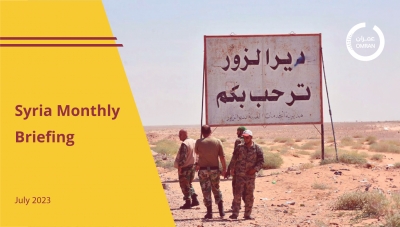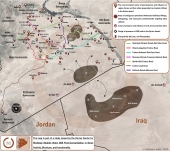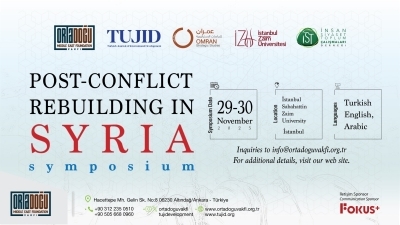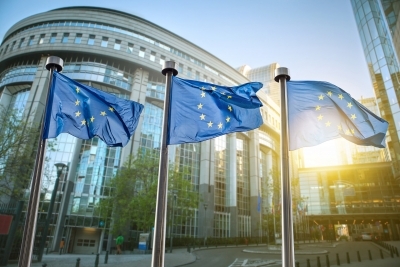General Summary
This report provides an overview of the key events in Syria during the month of July 2023, focusing on political, security, and economic developments. It examines the developments at different levels.
-
Security and Military Sector: The eastern parts of Syria have seen heightened military activity by several groups along the Euphrates River. Additionally, disagreements between the Deir Ezzor Military Council and the Syrian Democratic Forces “SDF” have led to armed clashes and road blockades in the northern Deir Ezzor villages and towns.
-
Political Sector: The continuation of the Arab rapprochement initiative, this rapprochement appears to be contingent on the reciprocal actions and offerings from the Assad regime, emphasizing a “Step-for-Step” approach. Furthermore, Russia's veto against the extension of cross-border aid challenges the UN and other humanitarian organizations, necessitating new strategies to deliver aid amidst Syria's dire humanitarian crisis.
-
Economic Sector: Syria's economic situation is deteriorating, marked by a significant rise in the cost of living paired with decreasing salaries. Concurrently, the Assad regime is aiming to further assert its control over vital resources and gain a monopoly over critical, high-revenue sectors, benefiting both the regime and its allies.
Internal Security Issues and Rising Military Presence Across Various Frontlines
Regime Held-Areas:
Israel conducted strikes on multiple security and military sites in the regions of Damascus countryside, Eastern Homs, and Tartus. Out of the five sites targeted, three are under the control of militias backed by Iran. ([1])
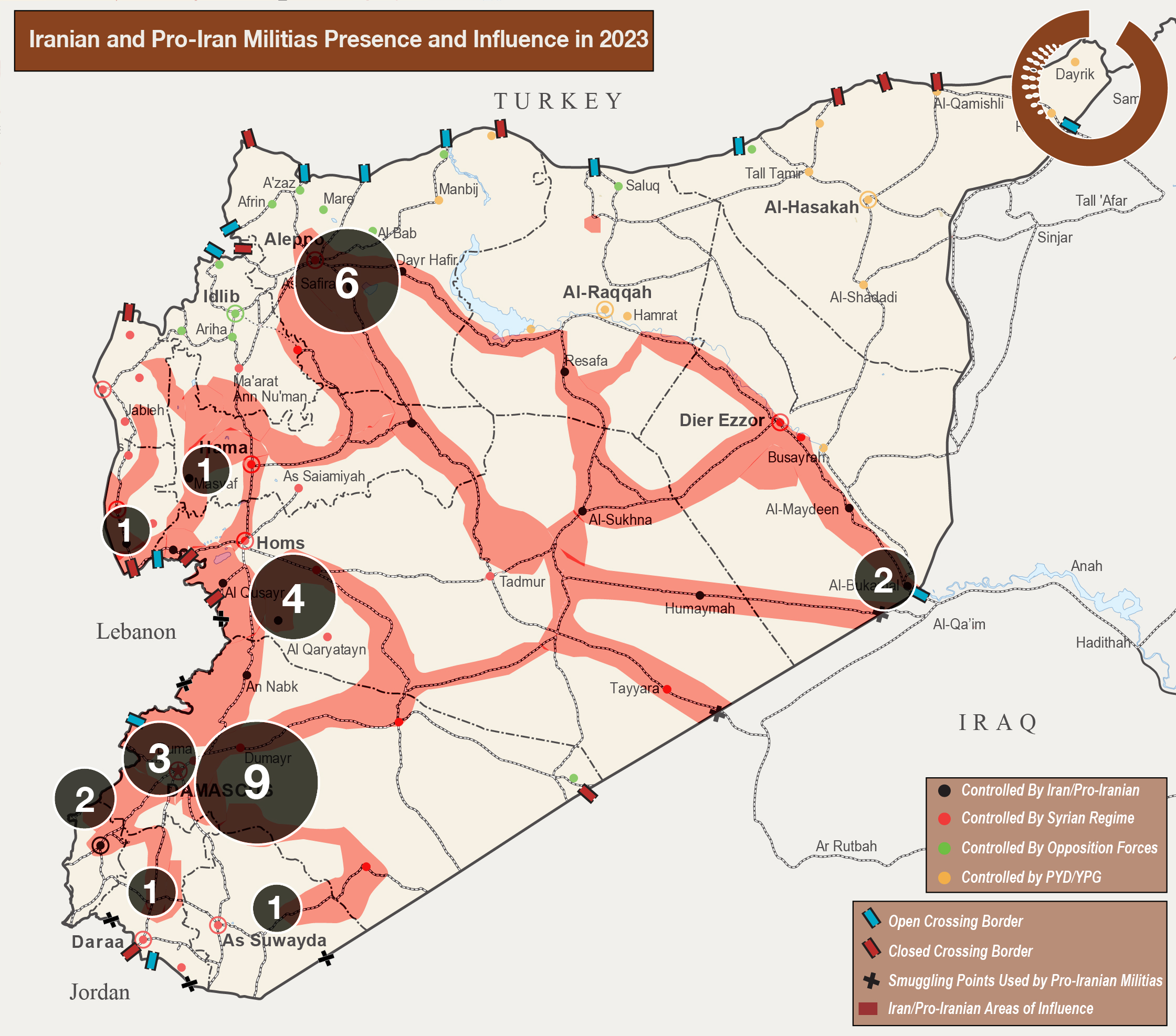
Map (1), Highlighting Israeli strikes in Syria from January of 2023 to July 2023
Security chaos continues in the south, /37/people were assassinated in Daraa province, with /20/ more in various security incidents throughout the month. During July, the regime used drones in its operations in Daraa, hinting at a shift to newer security tools, possibly supported by Iranian expertise.
In al-Suwayda Province, in retaliation for the regime's recent arrest campaign, local groups apprehended regime officers. Such incidents highlight the regime's fragile security control in the province.
Opposition Held-Areas:
Hay'at Tahrir al-Sham “HTS” continued its security campaign, arresting over /300/ of its members from different departments, accused of spying for the Syrian regime, Russia, or the USA.
SDF Held-Areas
Deir Ezzor witnesses military mobilizations by various parties along the Euphrates River.
-
Numerous military supply convoys for the International Coalition have reached their bases near the al-Omar oil field.
-
The Syrian Democratic Forces “SDF” have increased their presence and set up operations rooms in Deir Ezzor.
In the northern countryside of Deir Ezzor, several villages and towns experienced clashes between the “Deir Ezzor Military Council” and the SDF's Military Police. This conflict arose following the killing of two council members and the detention of several others.
International Coalition forces intervened to mediate and stabilize the situation, assuring that those responsible for the incident would be held accountable. These events highlighted the vulnerabilities within the SDF's internal unity and underscored concerns about the PKK's dominance over these forces, often sidelining local factions in decision-making.
A general strike took place in Manbij city against the conscription campaign carried out by the SDF.
Despite Renewing International Ties, Assad Regime Continues to Use Extortionate Behavior
Following the failure of the UN Security Council to extend the decision on cross-border aid delivery due to Russia's veto, the Assad regime announced that it would allow the UN and its specialized agencies to deliver humanitarian aid through the Bab al-Hawa crossing, on the condition that it would not be handed over to what he termed as “Terrorist Entities”, and the aid distribution should be coordinated with the Syrian Red Crescent. Several Western countries rejected this, and the UN considered it contrary to its independence and freedom of operation. The regime aims with this decision to control the UN aid and use it as a new tool to put more pressure on the international communities and the Syrian oppositions. Meanwhile, Bashar al-Assad received the Iraqi PM, Mohammed Shia' al-Sudani, in Damascus during his first official visit for an Iraqi PM since 2011. Al-Sudani emphasized the importance of coordination between the two countries. Assad mentioned the “Theft” of Syria's and Iraq's water by neighboring countries in supporting terrorism, referencing Turkey, Despite Erdogan's expressed willingness to meet with Assad, the path to reconciliation has been hindered due to the regime's preconditions, primarily the demand for a withdrawal timetable from Syria.
On a technical level, the first meeting of the Jordanian-Syrian Committee to Combat Cross-Border Drug Smuggling took place in Amman. This committee was established following the decisions made at the consultative meeting hosted by Jordan in Amman last May.
Fragile Markets and Increasing Economic Challenges
The SYP rate continued to fall against foreign currencies, registering /13,000/ SYP to the US Dollar in markets of Damascus, Aleppo, Idlib, and al-Hasakah. Meanwhile, the Regime Central Bank adjusted the US Dollar exchange rate to /9,900/ SYP for banking operations, money exchange companies, individuals, and foreign transfer exchange rates.

This month's SYP depreciation is attributed to the vast amount of money introduced into the market due to wheat payments, estimated at 2 trillion SYP (2,000 billion SYP) for purchasing /800,000/ tons of wheat from farmers in Regime held-areas. It's valued at $/516/ million in SDF held-areas in northeast, and $/64/ million in Opposition held-areas in northwest, causing a cash surplus. The central bank also approved printing a /5,000/ Lira note to add to market liquidity. The decrease in the SYP’s value led to a significant, uncontrolled increase in the prices of co0mmidities in regime held-areas, with some products witnessing over a 200% increase. The average living cost for a family of 5 in Syria has reached more than /6.5/ SYP, while the average salary stands at /150,000 SYP/.
Given these continuous crises, the PM of the regime, “Hussein Arnous”, announced the formation of a joint committee from the People's Assembly and the economic committee in the Council of Ministers to prepare a proposal to boost the economic and living conditions, even though the People's Council admits its inability to change the country's economic reality.
During the UN Food Systems Summit in Italy, Agriculture Minister “Mohammed Hassan Qatana” urged his Saudi counterpart, “Abdul Rahman al-Fadhli”, to ease the import of Syrian goods into the kingdom. Meanwhile, the Director General of the regime's Civil Aviation Corporation announced that Saudi Arabia has approved the resumption of flights between the two Syria and KSA. Consequently, the Syrian Arab Aviation Corporation has started setting up its offices in Riyadh.
The regime's Ministry of Transport announced an investment partnership with “Iluma”, a company closely linked to Bashar and Asma al-Assad, for the Damascus International Airport. The General Organization for Aviation will retain a 51% stake, while the investing company will hold 49%. “Iluma” will be responsible for all tasks and services related to air transport of passengers and goods, including owning, purchasing, leasing, and investing in aircraft, as well as organizing flights and ground services. This move underscores the regime's strategy to exert control over resources and monopolize key sectors, ensuring significant returns for itself and its allies.
In Opposition held-areas, food prices have surged by 48% in the past six months due to the depreciation of the Turkish lira. According to the UN REACH team, the minimum expenditure on basic food items has increased from /1,600/ TL to nearly /2,700/ TL within a year.
In eastern Syria, the Autonomous Administration raised fuel prices, leading to a temporary halt in sales at gas stations until new prices were set, also the cost of diesel for vehicles and industrial purposes rose from /425/ SYP to 525 SYP per liter, while the cost of free diesel rose from /1,200/ SYP to /1,700/ SYP per liter. However, diesel prices for generators and bread ovens remained unchanged, but the cost of a domestic gas cylinder increased, going from /7,500/ SYP to /10,000/ SYP.
The Autonomous Administration has designated the regions of al-Hasakah, Tal Tamr, and their surrounding areas, as disaster zones due to the ongoing water crisis. The water scarcity in Hasaka has worsened since 2019, primarily because of water supply disruptions from the opposition-controlled “Alouk” wells. Additionally, in al-Qamishli, the devaluation of the SYP value to less than a third of its value since early July has led to a decline in food sales. Both consumers and retailers have reported a drop in food orders by up to 70%.
[1]See Map (1) Israeli strikes break down in 2023, Map is designed by Omran team, and the information is based on credible open source along with Omran team special private source in Syria.

